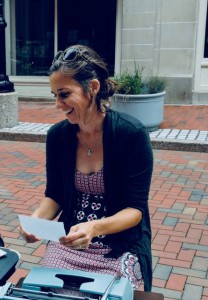HPL: What made you decide to become a writer?
I’ve always loved to write and ever since I was a child I knew I wanted to be a writer. I pursued creative writing in college and then went to graduate school for an MFA. I write mostly fiction (short stories, novels), but as a teaching artist, I love working with poetry. I feel like poetry offers the most direct route for people to express their deepest thoughts and feelings.
HPL: How did Poetry on the Streets come about?
I had the idea for Poetry on the Streets in 2017 and created it at Art on the Streets festival, sponsored by Greater Hartford Arts Council and Aetna in support of the connection between wellness and the arts. I decided to expand POTS because the public response was so positive—people were engaging, creating, expressing, connecting with others, and asking for more. When I was chosen as a Creative Community Fellow by National Arts Strategies, I received tremendous support and mentorship for this project, as well as connected with other artists and cultural entrepreneurs around New England doing creative and impactful work in their communities, and it helped me dig deeper into the mission of community engagement and the potential of Poetry on the Streets to benefit people.
HPL: From reading about Poetry on the Streets on the website, it feels like so many different things – community connection, performance art, writing workshops – did you anticipate when you set out the typewriter the first time what it would become?
I quickly realized it was more than just setting up a typewriter. It became a way for strangers to connect with one another, a space to express themselves spontaneously in a creative way, and a way to share their voices with others. When people reported feeling better both mentally and emotionally after writing a poem and asked for their words to be shared with others, I felt a responsibility to hold a space for this to happen. Along with workshops and other outreach programs, earlier this year, I held POTS’ first gallery show. For two years, I collected poems from people around the city and showcased them alongside their photographs at Charter Oak Cultural Center. It was a moving show because it brought together voices of people from so many different walks of life, all expressing a human emotion or experience.
Now, during this global pandemic and social distancing, I think it is a potent time for people to express themselves. For the past two years, Poetry on the Streets has existed as an interactive exhibit designed to engage passersby in writing spontaneous poetry, and it has been dependent upon human interaction and connection with strangers. We can still create these connections and break down barriers, but maybe this can be done virtually for now, or by some other measures, such as public installations, or engagement with public spaces while maintaining distancing. I believe now more than ever is an important time for Poetry on the Streets to work towards its mission of connecting people through creative self-expression and recognizing our humanity.
HPL: What do you believe the act of writing does for people?
In my work as a teaching artist in Chicago, New York City, Hartford, and Cuenca, Ecuador, I’ve seen the impact that writing can have on people of all ages and in many different circumstances: teens struggling with gang violence and bullying have felt empowered by finding their voices and expressing their struggles; youth dealing with changing families and unexpected deaths have experienced the transformative nature of writing through trauma; seniors dealing with declining health and loneliness have found revitalization through writing with others and sharing their stories; families have discovered new connections through collaborative writing and storytelling; And as a fiction writer, one also has the opportunity to identify with one’s characters and crawl inside their experiences and points of view, and I think this process, if done well, can increase our empathy and understanding.
HPL: What advice would you give someone who wants to write?
I think I would say just start writing, and most importantly, try to write from a place where you can let your guard down. The more you practice, play around with ideas, experiment, read, and write some more, the more you will find your own voice. I think that if it comes from inside you, and if it is authentic, it will, most likely, resonate with others. That’s what I’ve found through Poetry on the Streets anyway, there’s always someone out there who might identify with your experience and what you’re feeling.
Learn more about Melanie’s work at
Social Media Links to Follow:
https://www.instagram.com/poetryonthestreets//
https://www.facebook.com/poetryonthestreetsPOTS/
-30-
